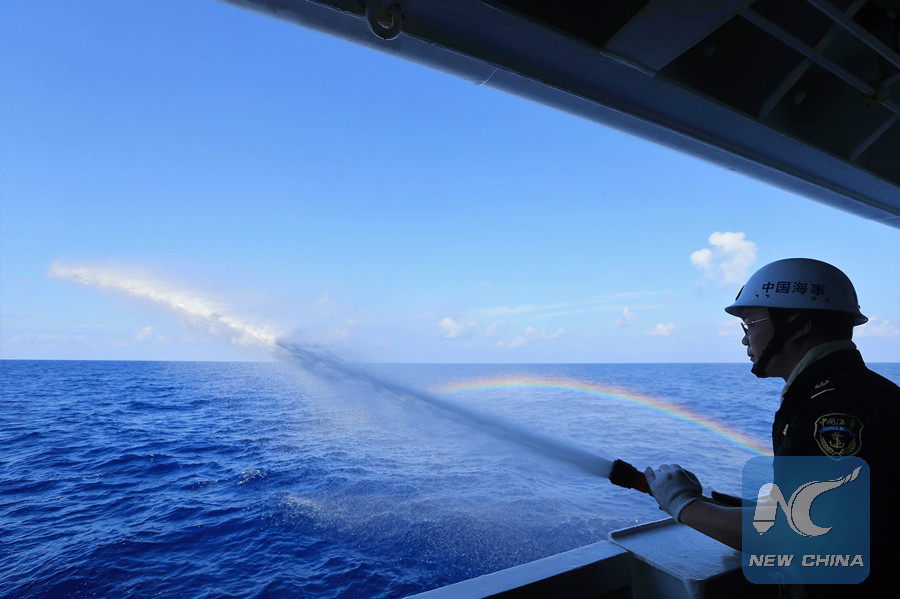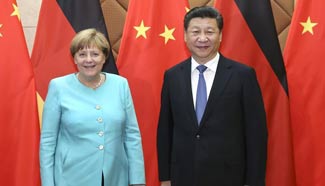
A crew member takes part in a fire drill on China's largest and most advanced patrol vessel Haixun 01 on the South China Sea, April 4, 2016. (Xinhua/Xing Guangli)
BUENOS AIRES, June 13 (Xinhua) -- The Philippines' ongoing maritime dispute with China over the South China Sea must be resolved through reasoned bilateral dialogue, said a leading Argentine economist and academic.
Unilateral measures only serve to damage the relationship between the two countries, Gustavo Girado, head of the Buenos Aires-based Asia & Argentina Consultancy, told Xinhua in a recent interview.
In 2013, Manila decided to take its case to the Permanent Court of Arbitration (PCA) in The Hague, a move that "didn't seem to be the most appropriate, since the decade-old agreements between the two countries have established a proper means to resolve their disputes," said Girado.
The unilateral move ran counter to the commitments the Philippines made as a signatory of the 2002 Declaration on the Conduct of Parties in the South China Sea (DOC), said the academic.
"The road the Philippines chose draws attention somewhat due to a number of factors which failed to justify that action, historic and political factors," said Girado.
"It's very clear that Chinese inhabitants were the first to name the region," he added.
On Wednesday, China again urged the Philippines to suspend its legal proceedings at the PCA and return to the negotiating table.
Chinese Foreign Ministry spokesperson Hong Lei made the remarks at a press conference, saying the door to bilateral talks will always be open.
"China will continue to be committed to a negotiated solution to the South China Sea dispute with the Philippines, based on historic facts and in accord with international law," he said.
Girado believes the dispute "doesn't merit intervention by third parties," such as an arbitration court, which "belongs to the last century."
In 2014, the Chinese Foreign Ministry issued a Position Paper on the arbitration, saying that the essence of the subject matter of the case is territorial sovereignty over several maritime features in the South China Sea, which is beyond the scope of the UN Convention on the Law of the Sea (UNCLOS) under which Manila initiated the arbitration.
China has repeatedly noted that since the 1970s, the Philippines has illegally seized by force maritime features of China's Nansha Islands in disregard of the UN Charter and the basic norms governing international relations, and this is "the root and direct cause" of the two countries' disputes over the South China Sea.
"It's appropriate for China not to take into consideration the resolution of arbitration, given the previous accord that allows for reaching a mutual agreement through peaceful, responsible negotiation," Girado said.
"Law of the Sea legislation precisely says that those who have a previous accord for bilateral resolution of disputes must take that route," he said.
With that in mind, said the academic, it seems "clear and wise on the part of Chinese diplomacy not to take into account any eventual decision (issued by the PCA), because it doesn't take into account China's opinion."
As to the likelihood of outside powers intervening in the dispute, Girado thought it's "evident." He explained that since U.S. President Barack Obama's first term, a policy has been established for the region, with the U.S. Navy's presence in a certain area in order to exert a degree of influence on matters of interest to the United States.
"It's a tremendously rich zone, through which half of the planet's maritime mercantile trade passes. I have no doubt there are concrete interests at play in the Filipino decision, which really calls one's attention," said Girado.
The academic underscored the need for a negotiated solution to the dispute, drawing parallels to Argentina's long-running conflict with Britain over the Malvinas Islands, known to the British as the Falklands.
Since the islands "were usurped by the world's leading capitalist economy back in the year 1833, different interests have been at play to prevent Argentina, a developing country, from staking a claim to what belongs to it."
In early June, China said it hoped the new government in the Philippines would return to the negotiating table.
After the Philippines' incoming Foreign Minister Perfecto Yasay signalled that bilateral talks with China could help deescalate the dispute, Chinese Foreign Ministry spokesperson Hua Chunying noted that successive leaders from both sides have agreed in past meetings and documents to resolve the issue peacefully through direct talks.
"We hope the new government of the Philippines fulfills its pledges and resumes talks with China to properly handle disputes in a way that contributes to the sound and stable development of bilateral ties," said Hua.
The incoming president of the Philippines, Rodrigo Duterte, has said he wants to promote friendly ties with China and that he is open to direct talks on the South China Sea dispute.
Related:
Spotlight: Experts say China's stance on South China Sea arbitration fully justified
BEIJING, June 10 (Xinhua) -- The Philippines' unilateral move to bring a maritime dispute with China to an international tribunal won't help resolve the problem and the right way forward is to seek settlement through bilateral talks, several foreign experts told Xinhua in recent interviews. Full story
Interview: Manila intensifies tension in South China Sea -- former diplomat
MANILA, June 9 (Xinhua) -- The Philippine government has been behind the intensifying tensions in the South China Sea, a former diplomat of the country told Xinhua on Wednesday.
Alberto Encomienda, former secretary-general of Maritime and Ocean Affairs Center of the Philippine Foreign Affairs Department, said: "China has been for the negotiations all along, but from the beginning we are not." Full story











